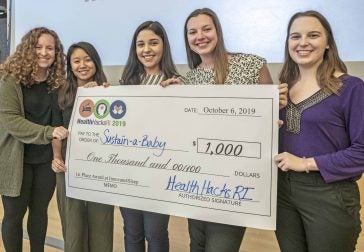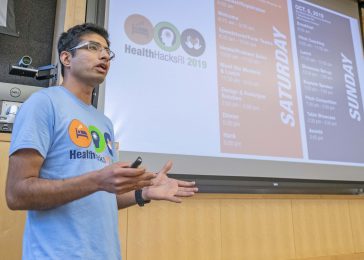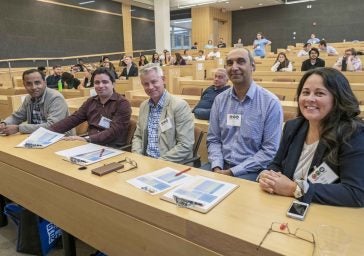
By Neil Nachbar
According to a survey conducted in 2018 of nearly 400,000 people, roughly one-third of Americans sleep fewer than six hours per night. With sleep being linked to cognitive and physical health, solutions to sleep deprivation are needed.
The 2019 HealthHacksRI event, held at the University of Rhode Island on Oct. 5-6, challenged students to identify a specific issue related to sleep, design a solution that would alleviate the problem and pitch the idea/product to a panel of judges.

Twenty-nine students from URI and the University of Massachusetts Dartmouth participated in this year’s hackathon.
“Their projects spanned the continuum from using no technology to being primarily technical,” said Deedee Chatham, director of entrepreneurship, innovation and undergraduate research at URI. “The ideas, teamwork, business models, and technical innovations were exceptional.”
A five-person team of URI industrial and systems engineering students captured first place and the $1,000 prize for their product “Sustain-a-Baby.”

The team was comprised of Nancy Alvarez, from Warwick, Rhode Island; Kelly Domogala, from Southbury, Connecticut; Robyn Johnson, from Elsah, Illinois; Megan St. Hilaire, from Rumford, Rhode Island; and May Tran, from Woonsocket, Rhode Island.
“It was nice a surprise that our team was recognized for all the hard work, time and effort we put into our idea and presentation,” said Domogala, who is a senior.
The team’s Sustain-a-Baby concept was based on parents’ lack of sleep when newborns stay awake.
“Our approach was to create a way for people to rent sleep technology and products,” said Domogala. “This business model would lower the costs for the customers and enable all of the products to be reused. The rental system would also help the environment because multiple families would use a single product over a span of years, when these products are usually only used for a few months.”
Each of the group members took on a different task. Domogala created a functional website. Johnson did a cost analysis. Alvarez researched products that could be rented. Tran looked into liability issues. St. Hilaire researched data about sleep deprivation among new parents.
“We knew how profitable the ‘rent instead of buy’ model could be if used correctly,” said Johnson, who is also majoring in Spanish through URI International Engineering Program. “Once a child outgrows an expensive sleeping product, such as a $1,200 bassinet, it can be returned to us and re-rented to another family.”
The hackathon format is designed to prompt students to think and act like an entrepreneur.
“Throughout the hackathon, I learned a lot about brainstorming, creating new business models and coming up with innovative ideas,” said Domogala.
The judges for the event were Sue Adams, professor of human development and family studies at URI; Krishna Kumar Venkatasubramanian, assistant professor of computer science and statistics at URI; Paul Zuchowski, senior software engineer at Datto, Inc.; Chris Patel, principal at Uplift Innovation, Inc.; and Amir Amiri of Draeger Medical.
This was Adams’ first time being involved in a hackathon at URI.
“As a sleep researcher and clinician, I was so pleased that this subject that everyone has some level of familiarity with was the theme,” said Adams. “The specific topics the students chose were very diverse and allowed the groups to focus on an area of interest to them, ranging from families to occupational hazards.”
Throughout the competition, the students were able to share their ideas and receive feedback from 12 mentors who represented academia and industry.
“The students demonstrated the utmost professionalism during their pitches, making it clear to me that they fully utilized their mentoring to prepare for their pitch,” stated Adams.
All of the students in the top three teams were from URI.
| Place | Product | Students | Major |
| First Place | Sustain-a-Baby | Nancy Alvarez | Industrial & Systems Engineering |
| $1,000 | Kelly Domogala | Industrial & Systems Engineering | |
| Robyn Johnson | Industrial & Systems Engineering | ||
| Megan St. Hilaire | Industrial & Systems Engineering | ||
| May Tran | Industrial & Systems Engineering | ||
| Second Place | Sleep Nano-Sensor | Mohammad Moein Safaee | Pharmacy |
| $500 | Negar Rahmani | Neuroscience | |
| Third Place | Sleep Safe | Alexandra Duntzee | Biomedical Engineering |
| $250 | John Hunter | Computer Engineering | |
| Kiera Mantyla | Biomedical Engineering |
